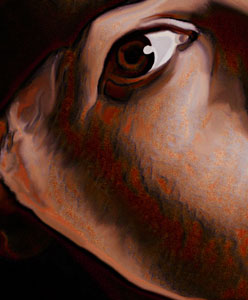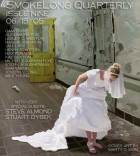I’m reading Sam Girgus’s “Desire and Narrativity in Annie Hall.’ It begins with this quote from Roland Barthes, “At the origin of Narrative, desire.” “Pornography” ends with “desire.” What desire generated it?
The desire to tell the truth. Also, I guess, to make sense of this strange, violent episode I witnessed when I was younger. That’s what a lot of my writing boils down to: an effort to understand why certain memories—particularly painful ones—persist.
The roots of pornography are Greek (figures, huh?)—porne (prostitute) + graphein (to write). A dictionary definition would explain that pornography is “intended to stimulate erotic rather than aesthetic or emotional feelings.” I don’t know about that “rather than” in the definition. What do you think?
It’s pretty simple for me. Pornography is about the glands. Art is about the heart. You watch or read porn to elicit a physical response. You read literature—even the erotic stuff—to elicit an emotional one. The idea is to feel more than you did before. If I’m doing anything less than that with my work, whether it includes graphic sex or not, it’s an act of exploitation.
Girgus also writes, “Desire and narrativity function together as two ineluctable parts of the same process of the unending search for self and identity.” This process occurs not only for characters, perhaps, but writers also. What role has writing played in your own search?
This is the sort of question that would take a year and a half to answer, if I wanted to get into all of it. The short version is: I’ve grown happier, and more hopeful, as I’ve learned how to use language to connect the world inside of me to the world outside.
Writing teachers, I imagine, struggle with discovering what “essential skills” of fiction writing can be taught and nurtured—and which ones must writers already naturally possess. We’d love to hear about “Almond’s Essential Skills of Fiction Writing.”
Everyone has their own little bromides, and my advice to students of writing (which is what we all are, basically) is to use the ones that help, and ignore the rest of them. With that caveat, here are a few of the rules with which I routinely pelt my students:
1. Fuck style. Tell the truth.
2. Love your characters all at times.
3. Slow down where it hurts.
4. Do what you can, each day, at the keyboard, and forgive yourself the rest.
The last one may be the most important. There are plenty of days where I get little to nothing done. They suck. But they are also a part of the process.
Speak a bit, if you don’t mind, about the evolution of your writing from My Life in Heavy Metal to B.B. Chow.
Heavy Metal was a constructed collection. I put it together with a binding theme—romantic misadventure—as this is often the only way a first-time short story writer can get a book out there. The publisher needs a hook. Anyone who read that collection (and thank you, whoever you are) knows that not all the stories were about guys screwing and screwing up, but that was how it got played.
With B.B. Chow, I just gathered together what I thought to be my best unpublished stories. There was no conscious effort to find a hook. As a result, it represents a much broader range of styles and themes. But, to be clear, I’ve always been all over the place as a writer. In fact, most of the strangest stories in B.B. Chow (including “Lincoln, Arisen” and “The Soul Molecule”) were written well before Heavy Metal came out.
Having said that, I do think my writing has changed. It’s become less confessional and didactic. I’m trying to find ways to be more evocative, less explanatory. But the essential writer I am — moralizing, heartbroken, emotionally insistent, earnest—that probably hasn’t changed much.



 The core workshop of SmokeLong Fitness is all in writing, so you can take part from anywhere at anytime. We are excited about creating a supportive, consistent and structured environment for flash writers to work on their craft in a community. We are thrilled and proud to say that our workshop participants have won, placed, or been listed in every major flash competition. Community works.
The core workshop of SmokeLong Fitness is all in writing, so you can take part from anywhere at anytime. We are excited about creating a supportive, consistent and structured environment for flash writers to work on their craft in a community. We are thrilled and proud to say that our workshop participants have won, placed, or been listed in every major flash competition. Community works.